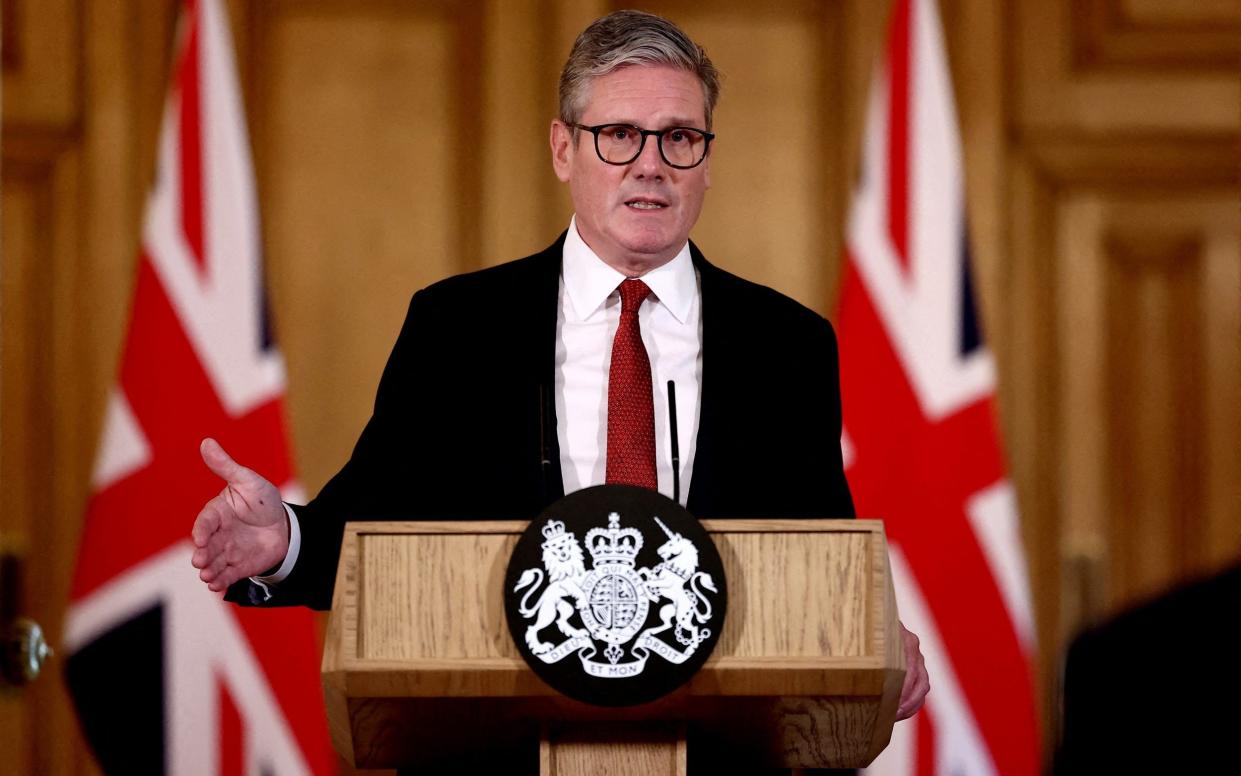Starmer rejects demands to recall Parliament amid riots

Sir Keir Starmer has rejected demands to recall Parliament to debate far-Right rioting across the UK.
The Prime Minister’s official spokesman said the Government’s “focus” was on tackling the rioting and co-ordinating with the police.
Nigel Farage has called on Sir Keir to recall Parliament, accusing him of a “faltering approach” to the rioting.
The Reform UK leader said the return of MPs to the Commons would provide the opportunity for a “more honest debate” about mass immigration and its impact on communities.
In a sixth day of violence on Sunday following the killings in Southport last Monday, hotels in other towns used to house asylum seekers were targeted and far-Right rioters clashed with Muslim protesters.
A mob in Middlesbrough shouted “smash the P---s” while targeting migrants’ homes, while social media footage appeared to show groups of Asian men attacking white men.
Lord Cameron recalled Parliament during the 2011 summer riots that followed the death of Mark Duggan in Tottenham, six days after unrest started.
Parliament is on its summer recess, and is not due to return until early September. It means that there are no Commons debates or ability for MPs to publicly question ministers face-to-face on their response.
The Prime Minister’s official spokesman said recalling Parliament was not discussed at the Cobra meeting on Monday, adding “The Government’s focus is on responding to the incidents of the last few days.”
In a statement on X, Mr Farage said he had been “totally appalled” by the levels of violence seen in the past week.
“The levels of intimidation and threat to life have no place in a functioning democracy,” he wrote. “That so many police officers have been injured trying to keep the peace is shocking, and we should not discount the use of the Army if the situation were to deteriorate further. In the short term we will quell the riots, but deeper long-term problems remain.
“Ever since the soft policing of the Black Lives Matter protests, the impression of two-tier policing has become widespread. The Prime Minister’s faltering attempts to address the current crisis have only added to that sense of injustice.”
Thousands of people gathered in London and across the country in June 2020 to demonstrate against the brutal killing of George Floyd by police in the US. The gatherings came despite police and ministers urging protesters to stay away because of fears over the spreading of Covid.
Dozens of arrests were made across weeks of protests, while one chief constable blamed Black Lives Matter and climate demonstrations for a rise in assaults on police officers.

Mr Farage, whose Reform UK party has advocated a “one in, one out” immigration policy, added: “The majority of our population can see the fracturing of our communities as a result of mass, uncontrolled immigration, whether legal or illegal.
“Yet to attempt to debate this in the public arena leads to immediate howls of condemnation. A population explosion without integration was always going to end badly. I have said this for many years.
“We must have a more honest debate about these vital issues and give people the confidence that there are political solutions that are relevant to them. A recall of Parliament would be an appropriate start to this.”
The calls from Mr Farage to recall Parliament followed those by Dame Priti Patel, a former home secretary who is running to replace Rishi Sunak as the Conservative leader.
“What we are seeing across the country right now is just extraordinary criminality,” Dame Priti told Times Radio.
“At the end of the day, crime and criminality is the responsibility of those who are perpetrating this and we now need to, in my view, as politicians, get some kind of grip of this, which is why I am calling for the recall of Parliament right now so that we can actually discuss these issues in a similar way.
“Back in 2011 those discussions took place, and actually we put our arm around the communities that were affected at the time.”
Far-Right riots took hold after the suspect accused of stabbing three young girls was falsely identified online as an asylum seeker who arrived in the UK by boat last year.
Last week, the 17-year-old charged with the murders at a Taylor Swift-themed dance class was named as Axel Muganwa Rudakubana, who was born to Rwandan parents in Cardiff.
Mr Farage’s intervention came as he was criticised by James Cleverly, the shadow home secretary, for sharing a social media post by Zia Yusuf, the Reform chairman. Mr Yusuf had written: “Nobody has done more to sow division among the British people than race-obsessed Labour.”
Asked about the remarks, Mr Cleverly told Sky News: “I’ve been critical of the Labour Party and some of the positions they’re taking. I don’t think it’s appropriate or healthy especially at times like this to add to toxicity and friction.
“I want this Government to succeed in calming this situation, in ending the violence. That is my priority. There will be a time when we need to have a calmer, broader assessment of what has happened, including the role of disinformation, including the role of agent provocateurs within the far-Right stirring people up and encouraging this kind of violence.
“But language like that I don’t think is useful. What we need to do right now is make sure this violence stops.”
Mr Farage separately came under fire last week after claiming in a social media video that important questions about the Southport attack remained unanswered. He speculated whether the “truth is being withheld” about the killing of three girls aged six, seven and nine, following social media rumours.


